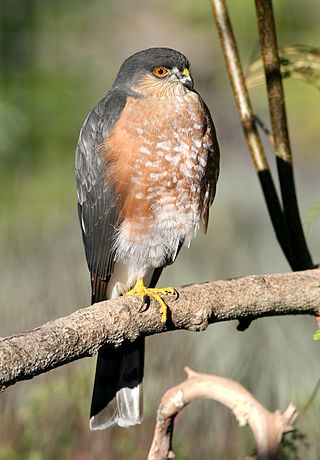
The sharp-shinned hawk or northern sharp-shinned hawk, commonly known as a sharpie, is a small hawk, with males being the smallest hawks in the United States and Canada, but with the species averaging larger than some Neotropical species, such as the tiny hawk. The taxonomy is far from resolved, with some authorities considering the southern taxa to represent three separate species: white-breasted hawk, plain-breasted hawk, and rufous-thighed hawk. The American Ornithological Society and some other checklists keep all four species conspecific.

The southern rough-winged swallow is a small swallow. It was first formally described as Hirundo ruficollis by French ornithologist Louis Vieillot in 1817 in his Nouveau Dictionnaire d'Histoire Naturelle.

The rufous-breasted wren is a small songbird of the family Troglodytidae. It is found in Colombia, Costa Rica, Panama, Trinidad and Tobago, and Venezuela.
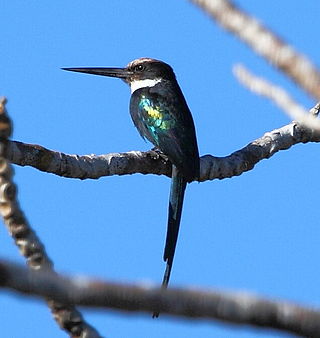
The paradise jacamar is a species of bird in the family Galbulidae. It is found in Bolivia, Brazil, Ecuador, French Guiana, Guyana, Peru, Suriname, and Venezuela.

The stripe-headed sparrow is an American sparrow which breeds from Pacific coastal south-western Mexico, including the transverse ranges, Cordillera Neovolcanica to Pacific coastal northern Costa Rica.
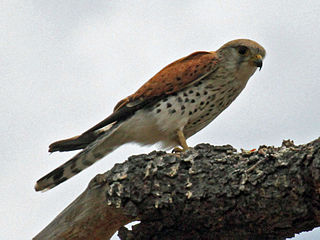
The Malagasy kestrel, also known as the Madagascar kestrel, Malagasy spotted kestrel, Newton's kestrel, Madagascar spotted kestrel, katiti (Creole) or hitsikitsika (Malagasy), is a small bird of prey of the genus Falco. It is named after British ornithologist Edward Newton. It occurs in two subspecies on Madagascar and at Aldabra. The race from Aldabra is also called Aldabra kestrel. Its closest living relative is the Seychelles kestrel; they were at one time considered conspecific. Their common ancestors appear to have diverged very recently, probably less than 1 million years ago during the Early or Middle Pleistocene. The Mauritius kestrel is more distantly related.(Groombridge et al. 2002)

The rufous owl, also known as the rufous boobook, is a species of owl in the family Strigidae. It was described in 1846 by John Gould, an English ornithologist. Its common name reflects the rufous-coloured feathers that these owls are covered with in adulthood. While it is uncommon, the species has a wide range, including Australia, Indonesia, and Papua New Guinea.

The narrow-billed woodcreeper is a species of bird in the subfamily Dendrocolaptinae of the ovenbird family Furnariidae. It is found in Argentina, Bolivia, Brazil, Paraguay, Suriname, and Uruguay.

The rufous piha is a species of bird in the family Cotingidae. It is found in Belize, Colombia, Costa Rica, Ecuador, Guatemala, Honduras, Mexico, Nicaragua, and Panama. Its natural habitat is subtropical or tropical moist lowland forests.
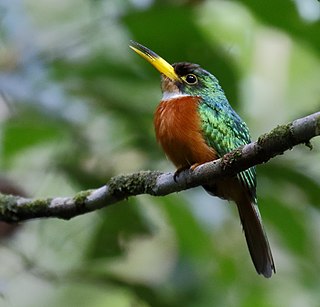
The yellow-billed jacamar is a species of bird in the family Galbulidae. It is found in Brazil, Colombia, Ecuador, French Guiana, Guyana, Peru, Suriname, and Venezuela.
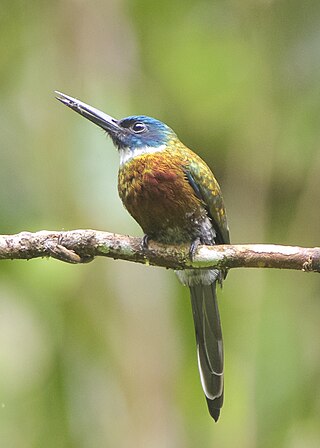
The purplish jacamar is a species of bird in the family Galbulidae. It is found in Brazil, Colombia, Ecuador, and Peru.

The bluish-fronted jacamar is a species of bird in the family Galbulidae. It is found in Bolivia, Brazil, and Peru.
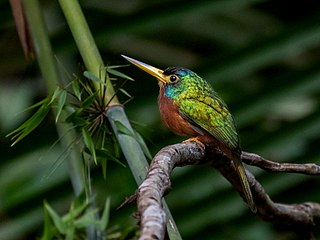
The blue-necked jacamar or blue-cheeked jacamar is a species of bird in the family Galbulidae. It is found in Brazil, Bolivia, and Peru.

The green-tailed jacamar is a species of bird in the family Galbulidae. It is native to Brazil, Colombia, French Guiana, Guyana, Suriname, and Venezuela.
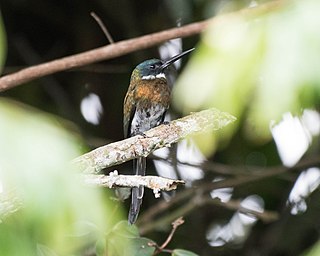
The bronzy jacamar is a species of bird in the family Galbulidae. It occurs in Bolivia, Brazil, Colombia, French Guiana, Guyana, Suriname, and Venezuela.

The coppery-chested jacamar is a species of bird in the family Galbulidae. It is found in Colombia, Ecuador and Peru.
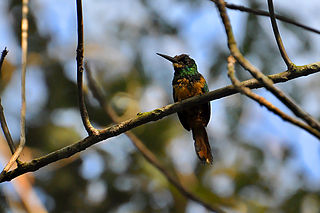
The white-chinned jacamar is a species of bird in the family Galbulidae. It is found in Brazil, Colombia, Ecuador, and Peru.
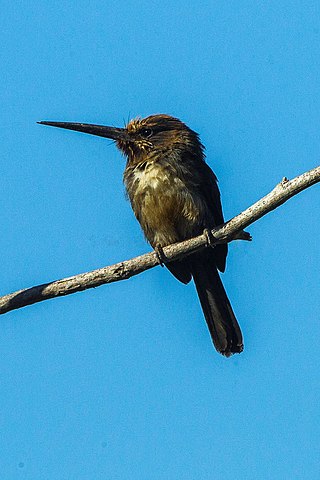
The three-toed jacamar is a species of bird in the family Galbulidae. It is monotypic within the genus Jacamaralcyon.
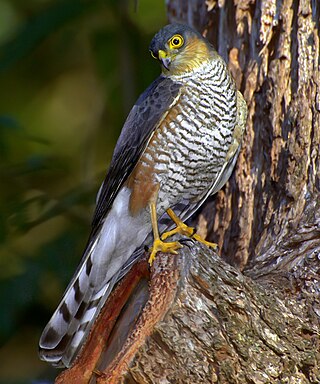
The rufous-thighed hawk is a small hawk found from southern Brazil and southeastern Bolivia to Paraguay, Uruguay and northern Argentina. It is usually considered a subspecies of the sharp-shinned hawk by most taxonomists, including the American Ornithological Society, but the taxonomy is far from resolved, with some authorities considering the southern taxa to represent three separate species: white-breasted hawk, plain-breasted hawk, and rufous-thighed hawk.

Galbuli is one of the two suborders of the order Piciformes. It includes two families, Bucconidae (puffbirds) and Galbulidae (jacamars), both restricted to the Neotropics.


























